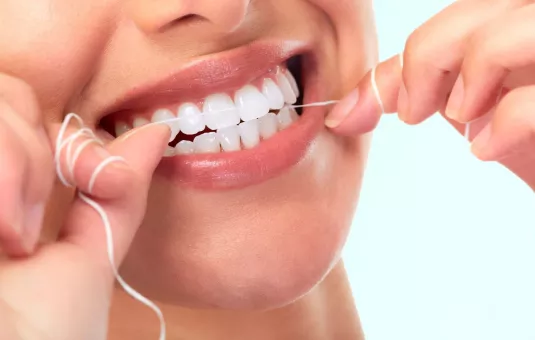
Dentists don’t just treat problems in your mouth. Their biggest focus is on trying to prevent oral health problems from happening in the first place.
Preventative dental care involves you and your dentist working together to keep your teeth and gums as healthy as they can be.
What is preventative dental care?
The preventative care approach to dentistry aims to keep oral health problems such as tooth decay and gum disease at bay.
It’s something you do every day, when you brush and floss your teeth and choose healthy food and drink options that are less likely to cause damage (think water instead of fizzy drinks or nuts instead of hard caramels). Your dentist plays an important role too, which is why it’s recommended that you visit the dental clinic at least twice a year.
Follow these four steps to preventative dental care to give your teeth and gums the tender loving care they deserve.
1. Practise good oral hygiene
If bacteria are allowed to multiply in your mouth, this can cause plaque to form on your teeth, leading to cavities and gingivitis. That’s why it’s important to keep your mouth as clean as possible every day.
Good oral hygiene involves:
- Brushing your teeth and gums at least twice a day using a fluoride toothpaste
- Flossing between your teeth at least once a day to remove food from hard-to-reach areas
- Rinsing your mouth with a fluoride mouthwash or other mouthwash recommended by your dentist.
While it may sound silly, there’s a right and wrong way to brush and floss your teeth. Your dentist can show you how to brush and floss properly as well as offer other advice to help you improve your oral hygiene habits.
2. Lower your risk factors
Even if you brush and floss every day, you could still be putting your oral health at risk in other ways. You can reduce your risk factor for problems such as gum disease by:
- Eating a balanced diet and limiting snacks
- Avoiding sugary and acidic food and drinks
- Drinking plenty of water throughout the day
- Quitting smoking (go on, kick it).
You’ll also be at a higher risk of infection if you have a health condition such as diabetes, making preventative care even more important in these cases. Certain medications can also encourage plaque build-up in the mouth by reducing saliva production, in which case you should talk to your doctor about changing your prescription.
3. Protect your teeth
Preventative care is about protecting your teeth. If you play contact sports like rugby, football or hockey, you should wear a custom-made sports mouthguard to reduce any risk of injury and trauma to your teeth and gums. The Australian Dental Association (ADA) also advises wearing a mouthguard for non-contact sports that carry a risk of collisions, including basketball, cricket and skateboarding.
The ADA recommends custom-fitted mouthguards provided by your dentist to give your teeth the best protection. Cheap loose-fitting mouthguards bought over the counter can cause problems with breathing and speech, making injuries worse if they lodge in your throat. [1]
Your dentist may also prescribe a night splint if you have a teeth grinding habit at night. This is a common condition known as bruxism and can cause your teeth to wear down and become more sensitive. More seriously, it can lead to jaw problems such as temporomandibular joint dysfunction (TMD).
4. Visit your dentist
Keepin up with your regular dental appointments is another essential part of preventative care. As well as examining your teeth and gums and professionally cleaning your teeth to remove plaque, your dentist will offer advice to help you take the best care of your oral health and may recommend treatments to strengthen or protect your smile.
If you avoid going to the dentist because of anxiety or fear of pain, you’ll be putting your oral health at risk and it’s more likely you’ll need a procedure in the future. Our team have a range of pain management options to help make the experience easier. Getting a check-up twice a year gives your dentist the best chance to catch problems such as gum disease early, when they’re easier to treat and damage can usually be reversed.
If you’re due for your next check-up, get in touch with our dentists in Perth’s northern suburbs. You can call us on 08 9307 6700 or make an appointment online.
Sources
[1] Australian Dental Association (ADA). Mouthguards [Online] 2017 [Accessed July 2017] Available from: https://www.ada.org.au/Your-Dental-Health/Teens-12-17/Mouthguards

